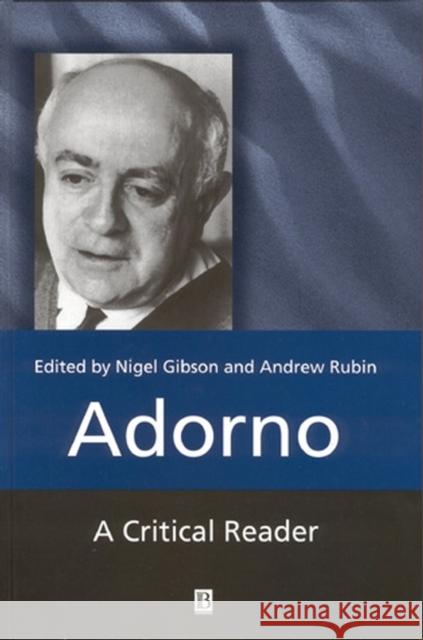Adorno » książka



(netto: 544,76 VAT: 5%)
Najniższa cena z 30 dni: 565,02
ok. 30 dni roboczych.
Darmowa dostawa!
Adorno: A Critical Reader presents a collection of new essays by many of the world's top critics that examine Adorno's lasting impact on the arts, politics, history, philosophy, psychoanalysis, and sociology.
"There is a kind of poetic justice in the fact that Adorno is the great survivor of the Frankfurt School, the only one whose thought retained its full actuality. However, the same thing he said for psychoanalysis that its truth resides in its very exaggerations goes for his own thought: he is at his most subversive when he gets involved in a deadlock. For this reason, this critical reader, focused on these deadlocks, is not just a commentary on his thought, but literally
part of it. In short, this book is simply a
must!"
Slavoj Zizek, Kulturwissenschaftliches Institute, Essen
"Against all odds, Adorno has emerged at the dawn of the twenty–first century as arguably the leading theoretical inspiration of our time. These stimulating essays, written by fresh as well as familiar commentators on his oeuvre, go a long way towards explaining the power of his ideas and demonstrating their abiding relevance." Martin Jay, University of California, Berkeley
Contributors.
Acknowledgments.
Introduction: Adorno and the Autonomous Intellectual: Nigel Gibson and Andrew Rubin (both Columbia University).
Part I: Politics and Culture:.
1. Adorno in Reverse: From Hollywood to Richard Wagner: Andreas Huyssen (Columbia University).
2. Mass Culture as Hieroglyphic Writing: Adorno, Derrida, Kracauer: Miriam Hansen (University of Chicago).
3. Theodor W. Adorno and the Dialectics of Mass Culture: Douglas Kellner (University of California, Los Angeles).
4. Adorno′s Politics: Russell Berman (Stanford University).
5. "Why were the Jews Sacrificed?": The Place of Antisemitism in Adorno and Horkheimer′s Dialectic of Enlightenment: Anson Rabinbach (Princeton University).
6. Demythologizing the Authoritarian Personality: Reconnoitering Adorno′s Retreat from Marx: Lou Turner (North Central College, Illinois).
7. The Adorno Files: Andrew Rubin (Columbia University).
Part II: Aesthetics:.
8. Adorno as Lateness Itself: Edward W. Said (Columbia University).
9. Immanent Critique, or Musical Stocktaking? Adorno and the Problem of Musical Analysis: Max Paddison (University of Durham).
10. Adorno and the New Musicology: Rose Rosengard Subotnik (Brown University).
Part III: Critical Theory and After:.
11. Rethinking an Old Saw: Dialectical Negativity, Utopia, and Negative Dialectic in Adorno′s Hegelian Marxism: Nigel Gibson (Columbia University).
12. Hegel on Trial: Adorno′s Critique of Philosophical Systems: Mauro Bozzetti (University of Urbino, Italy).
13. The Dialectic of Theory and Praxis: On Late Adorno: Henry W. Pickford.
14. Radical Art: Reflections after Adorno and Heidegger: Krzysztof Ziarek (University of Notre Dame).
15. Queerly Amiss: Sexuality and the Logic of Adorno′s Dialectics: Jennifer Rycenga (San José State University).
16. "As though the end of the world had come and gone" or Allemal ist nicht immergleich Critical Theory and the Task of Reading: Samuel Weber (University of California, Los Angeles).
Bibliography.
Index.
Nigel Gibson is Visiting Assistant Professor at the Institute of Liberal Arts and Interdisciplinary Studies at Emerson College in Boston, where he teaches philosophy and postcolonial studies. He is also a research associate at Harvard University and at Brown University. He is editor of Rethinking Fanon (1999) and co–editor, with George C. Bond, of Contested Terrain and Contested Categories: Africa in Focus (2001).
Andrew Rubin is currently a doctoral candidate in the Department of English and Comparative Literature at Columbia University. He is editor of The Edward Said Reader (2000), and has written articles for a variety of national magazines and newspapers, including The Nation.
Adorno: A Critical Reader presents a collection of new essays by many of the world′s top critics, who examine Adorno′s lasting impact on the arts, politics, history, philosophy, psychoanalysis, and sociology.
Few intellectuals captured as much critical attention in the late twentieth century as Theodor W. Adorno. A growing number of his writings, lectures, and addresses have recently become available in English, a development that has inspired a reassessment of his oeuvre and placed Adorno at the center of debates about the role and responsibilities of the intellectual.
Readers interested in the origins of cultural studies and critical theory will find this book an important examination of the broad work of one of the major intellectuals of the twentieth century. Those interested in the arts, politics, history, philosophy, psychoanalysis, and sociology will delight in this important collection of essays that re–evaluate Adorno′s work in the context of the many fields that his writings have shaped irreversibly.
1997-2026 DolnySlask.com Agencja Internetowa
KrainaKsiazek.PL - Księgarnia Internetowa









